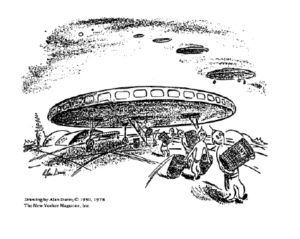July 27
Robert M. Solow (2004, p. 153) in Lives of the Laureates: “To be honest, I should warn you that I am going to tell you as little about myself as I can get away with in a lecture about ‘My Evolution as an Economist.’ My reason is not that I have anything to hide. I wish I had more to hide; that would at least suggest an exciting life. My problem is that I think the ‘cult of personality’ is slowly swamping our culture. You can see it at its most dangerous in presidential elections, where eyebrows seem to be more important than ideas. I tend to blame that on television, which is a better medium for eyebrows that for economic theory. But that sort of technological determinism won’t quite do: it leaves us with the task of explaining the psychologization of almost everything, the success of pop books on character, the fact that seven out of ten nonfiction best sellers are biographies, the importance attached to the ‘personal relationship’ between Mr. Reagan and Mrs. Thatcher. Something pretty deep is going on there. (I don’t mean between Mr. Reagan and Mrs. Thatcher!)… Anyway, what I have called the cult of personality has to be a sign of cultural decay.”
We will look at a set of interesting but heterogeneous scholars and great minds.
- Herbert A. Simon (1996). Models of My Life.
- Herbert Simon is one of the most fascinating scholars in the history of science. How is it possible to be on top of so many different fields? He might be the first and perhaps even the last scholar who was (among other things22) able to win the Nobel Prize in Economics and the Turing Award (“Nobel Prize in computing”). In his wonderful autobiography we will get insights about his entire academic journey and his life in general.
- S. M. Ulam (1976). Adventures of a Mathematician.
- We cover a lot of ground with Ulam’s book (e.g., Princeton Days, Harvard Years, Los Alamos). Von Neumann once told Ulam’s wife that he had never met anyone with as much self-confidence, adding that perhaps it was somewhat justified. His book is fun to read and insightful: “Little has been written about the lives of the people responsible for so much in science and in the birth of the nuclear age and space age: von Neumann, Fermi, and numerous other mathematicians and physicists. But here I want to recount also the more abstract and philosophically decisive influences which came from mathematics itself. Names like Stefan Banach, G. D. Birkhoff, and David Hilbert are virtually unknown to the general public, and yet it is these men, along with Einstein, Fermi and a few others equally famous, who were indispensable to what twentieth-century science has accomplished”.
- Roger E. Backhouse (2017). Founder of Modern Economics: Paul A. Samuelson (Volume 1).
- Young Samuelson was once challenged by Ulam to state one proposition in social science that is both true and nontrivial. Samuelson’s answer several years later was: comparative advantage. “That it is logically true need not be argued before a mathematician; that it is not trivial is attested by the thousands of important and intelligent men who have never been able to grasp the doctrine for themselves or to believe it after it was explained to them”. Samuelson’s witty remarks have a timely component which most mathematical economists fail to implement in their work: “I can claim that in talking about modern economics I am talking about me. My finger has been in every pie. I once claimed to be the last generalist in economics, writing about and teaching such diverse subjects as international trade and econometrics, economic theory and business cycles, demography and labor economics, finance and monopolistic competition, history of doctrines and locational economics. Kilroy, having been there, must share the guilt. (Goethe wrote that there was no crime he ever heard of that he didn’t feel capable of committing. Bob Solow’s reaction was that Goethe flattered himself. And perhaps what I called “crime” is a mistranslation of what Goethe meant only as “error”” (p. 52). Roger Backhouse, an excellent scholar in the history and philosophy of economics25 takes up the challenge of providing a biography of Paul Samuelson.
- Murray Gell-Mann (1994). The Quark and the Jaguar: Adventures in the Simple and the Complex.
- This is not an autobiography of Gell-Mann’s life (he is a recipient of the Nobel Prize in Physics and a co-founder of the Santa Fe Institute), but a collection of his views on “an emerging synthesis at the cutting edge of inquiry into the character of the world around us – the study of the simple and the complex” (Preface).
- James Gleick (1993). Genius: The Life and Science of Richard Feynman.
- Gell-Mann talks about Feynman, who was responsible for bringing Gell-Mann to Caltech. A very large compilation of videos about Feynman are available here. Freeman Dyson on Feyman: “What have Jonson and Shakespeare to do with Richard Feynman? Simply this. I can say as Jonson said: “I did love this man this side idolatry as much as any.” Fate gave me the tremendous luck to have Feynman as a mentor. I was the learned and scholarly student who came from England to Cornell University in 1947 and was immediately entranced by the slapdash genius of Feynman. With the arrogance of youth, I decided that I could play Jonson to Feynman’s Shakespeare. I had not expected to meet Shakespeare on American soil, but I had no difficulty in recognizing him when I saw him” (Foreword in The Pleasure of Finding Things Out).
- Thomas Blass (2004). The Man Who Shocked the World: The Life and Legacy of Stanley Milgram.
- Milgram’s research on obedience is among the most famous work in psychology’s history. We will take a look at his creative experimental mind covering wide-ranging topics and problems (e.g., six degrees of separation, lost-letter technique, or mental maps of cities). According to Blass, the book “is the product of my twenty-year immersion in Milgram’s eye-opening and sometimes troubling research”. Philip G. Zimbardo (see, e.g., Stanford Prison Experiment) calls the book “A tour de force”.
- Robert Trivers (2015). Wild Life: Adventures of an Evolutionary Biologist.
- A testament to individual intensity and passion by one of the most original evolutionary thinkers.
- Walter Isaacson (2017). Leonardo da Vinci.
- You can’t read biographies of great minds without including Leonardo da Vinci. Many scholars have written about Leonardo (e.g., Serge Bramly, Leonardo: The Artist and the Man; Edward McCurdy, The Mind of Leonardo da Vinci; Fritjof Capra, The Science of Leonardo and Learning from Leonardo: Decoding the Notebooks of a Genius). Even Freud wrote about Leonardo (Leonardo da Vinci: A Memoir of his Childhood), an attempt which Ernest Jones compares to an archaeological reconstruction of a mind that is not accessible to direct investigation, as it was based on detailed psycho-analytic knowledge of living persons. We will look at the most recent book on Leonardo by the acclaimed biographer Walter Isaacson.
- Abraham Pais (2008). Subtle Is the Lord: The Science and the Life of Albert Einstein.

- Can you read it? “Raffiniert ist der Herrgott aber boshaft ist er nicht” (above the fireplace in the faculty lounge of the mathematics building in Princeton (Fine Hall))
A lot has also been written about Einstein. Gerald Holton (see last year’s list) provides many insights on Einstein throughout his own work. Roger Penrose on the Pais book: “This book was surely the biography that Einstein himself would have most valued”. Being a theoretical physicist allows Pais to grasp and then communicate Einstein’s strength in handling ideas, providing a coherent account of his scientific significance.
- David N. Schwartz (2017). The Last Man Who Knew Everything: The Life and Times of Enrico Fermi29, Father of the Nuclear Age.
- Schwartz, son of Nobel Laureate Melvin Schwartz: “What you will find in this book, I hope, is a narrative that brings the whole person into focus. It is tempting to say, as did many of his colleagues, that he was “all physics, all the time,” and there is an element of truth to this. But he was also a husband, a father, a colleague, and a friend. He played a central role in some of the most important events of the twentieth century. The drama of his life can only be appreciated through an examination of all of these aspects”.

- Isaac Asimov (2002). It’s Been A Good Life (edited by Janet Jeppson Asimov).
- We all know – or have at least heard of – Asimov’s work in science fiction and popular science. He was brilliant at explaining scientific concepts effortlessly and with historical background. Marvin Minsky was keen to understand the secret of his prolific writing (he wrote or edited more than 500 books and around 90,000 letters and postcards) but he didn’t get a satisfactory answer from Asimov… Let’s take a short look at his life.
- R. Buckminster Fuller (2003). Guinea Pig B: The 56 Year Experiment.
- An honest description of Bucky’s life insights and his wisdom. Many regarded Bucky as the 20th Century Leonardo da Vinci. His daughter acknowledges that “it is important to recognize that it took him about thirty-two years to sort out his priorities and for him to understand himself well enough to really pursue the course of action that he then pursued. It was a course of action that demanded his full integrity in listening to himself, in challenging himself, and at the same time being deeply aware of all that surrounded him”.
- Andrew Robinson (2007). The Last Man Who Knew Everything: Thomas Young, the Anonymous Genius Who Proved Newton Wrong and Deciphered the Rosetta Stone, Among Other Surprising Feats.
- In the Preface of his book, Robinson (also author of Sudden Genius? The Gradual Path of Creativity) writes: “Versatile people have always fascinated me as a biographer. Most recently, there was Albert Einstein, who, as everyone knows, fathered diverse new fields of science, but who also influenced some crucial areas of international politics. Before Einstein, Michael Ventris, a professional architect who in his spare time deciphered Linear B, the earliest European writing system, and became revered by archaeologists. And before Ventris, two prodigious Indians, the writer Rabindranath Tagore and the filmmaker Satyajit Ray, both of whom were intensely creative in areas outside literature and cinema. But I must admit that Thomas Young (19773-1829), for sheer range of expertise, beats them all”.
